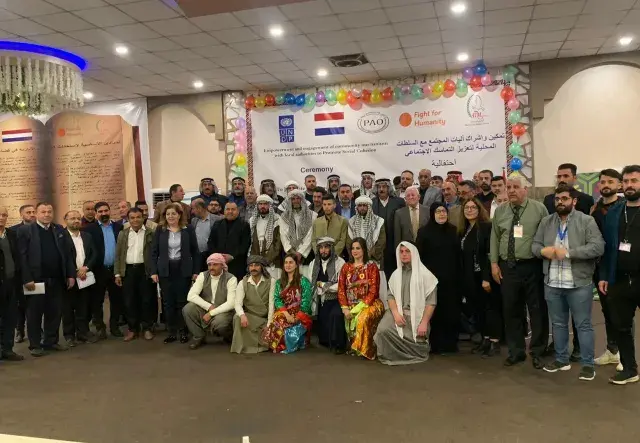Success story - “Empowerment and Engagement of Community Mechanisms with Local Authorities to Promote Social Cohesion” project

In the remote northern reaches of Iraq, nestled in a land with a rich history and culture, lies the Nineveh governorate. This diverse region, home to a tapestry of ethnic groups including Sunnis, Shiites, Christians, Kaka'is, Yezidis, Turkmen, and Shabak, had faced unimaginable suffering since the early 2000s. The nadir came in 2014, when the Islamic State of Iraq and the Levant, or ISIL, swept through northern Iraq, bringing a wave of violence and terror.
ISIL's brutal campaign targeted minorities, with Christians and Yazidis suffering the most. They committed horrendous acts—executing people, training child soldiers, enslaving women, and forcing captives to abandon their religions and cultures. The Assyrian-Chaldean-Syriac people, who had called Nineveh home for over a millennium, were forced to flee, finding refuge in the city of Ankawa in Iraqi Kurdistan. Their homes, churches, and public properties—over 12,900 houses, 360 churches, and 140 public buildings—were reduced to rubble.
In trying to erase these communities from Nineveh, ISIL aimed to destroy a heritage dating back to 6000 BC, a living testament to Mesopotamia's rich history. Although the violence has diminished in recent years, the scars of war remain. Trust, both in authorities and among communities, is deeply fractured. A 2016 survey by Norwegian Church Aid revealed that only 12 percent of Nineveh's residents felt they could trust most people around them.
Amidst this backdrop of distrust and devastation, a beacon of hope emerged through the project "Empowerment and Engagement of Community Mechanisms with Local Authorities to Promote Social Cohesion." This initiative, supported by the United Nations Development Programme (UNDP) and executed by a trio of organisations—Public Aid Organisation (PAO), the Alliance of Iraqi Minorities Network (AIM), and Fight for Humanity Organisation—focused on five minority-inhabited areas: Sinjar, Snuni, Hamdaniya, Talkeyf, and Bashiqa.
The project began with a thorough needs assessment, leading to a series of activities designed to bridge divides and heal wounds. These included Focus Group Discussions with community representatives, workshops with local officials and security forces, mediation and dialogue sessions, and the creation of "local peace agreements.” These agreements, embodying commitments to human rights and gender equality, aimed to mend the social fabric torn apart by years of conflict.
The response to the project was overwhelmingly positive. It rekindled a sense of community and mutual understanding among Nineveh's diverse groups. One Christian beneficiary remarked, "This project helps to rebuild the social fabric in Nineveh, which consists of vulnerable and marginalized minority communities like the Yezidis, Kurds, Turkmens, Shabaks, Kakais, Christians, and the Sunni and Shia Arabs. It amplifies their voices, addresses their needs, and strengthens the capacity of local authorities, police, and security to support social cohesion and peaceful coexistence."
Another beneficiary from the Al-Shabak group echoed these sentiments, highlighting how the project succeeded in restoring social ties, trust, and shared goals. These renewed connections are essential for ensuring political, social, and economic stability in Nineveh for the years to come.
And so, the story of Nineveh, once marred by pain and conflict, now holds a promise of peace and unity, thanks to the dedicated efforts to rebuild what had been torn apart.
This article was written by the Alliance of Iraqi Minorities and is licensed under CC BY-NC 4.0.



